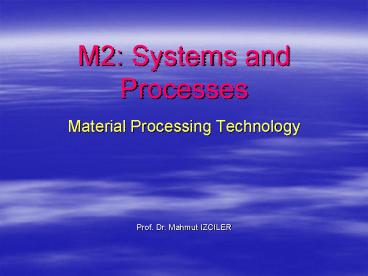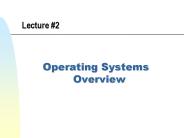M2: Systems and Processes - PowerPoint PPT Presentation
1 / 14
Title:
M2: Systems and Processes
Description:
M2: Systems and Processes. Material Processing Technology ... Cutting Threads, Mechanical Fasteners-Machine Screws and rivets. Grinding. Tempering, Hardening ... – PowerPoint PPT presentation
Number of Views:20
Avg rating:3.0/5.0
Title: M2: Systems and Processes
1
M2 Systems and Processes
- Material Processing Technology
Prof. Dr. Mahmut IZCILER
2
GU (TR) Material Processing Technology
- Manufacturing Technologies
- Welding and sheet metal forming
- Computer Aided Manufacturing
- Plastics and Ceramics Technology
3
Structure M2 Systems and Processes
Main Modul
Module
Module
Lecture
4
Structure Main Modules
- Main Module 2 Material Processing Technology
consists of four Sub-Modules - - Module 1 Manufacturing Processing
Technology - - Module 2. Computer Aided Manufacturing
- - Module 3 Welding and sheet metal forming
- - Module 4 Plastics and Ceramics Technology
Main Module 2 Material
Processing Technology
Module 1 Manufacturing Processing Technology
Module 3 Welding and sheet metal forming
Module 2 Computer Aided Manufacturing
Module 4 Plastics and Ceramics Technology
5
Structure - Modules
- Module 1 Manufacturing Processing Technology
consists of two Lectures - - Basic Manufacturing Technologies(2 hours
theory) - Practical
Training(2hours practice) - Credit
Module 1 Manufacturing Processing
Technology
6
Structure - Modules
- Module 2 Computer Aided Manufacturing consists
of two Lectures - - Computer integrated
manufacturing and CNC programing (2 hours - theory)
- - Practical Training(1hour
practice) - Credit
Module 2 Computer Aided Manufacturing
7
Structure Modules -
- Module 3 Welding and sheet metal forming
consists of two Lectures - - Welding and sheet metal forming tecniques(2
hours theory) - Practical
Training(2hours practice) - Credit
Module 3 Welding and Sheet Metal
Forming
8
Structure Modules
- Module 3 Plastics and Ceramics Technology
- consists of two Lectures
- - Lecture Plastic and Ceramic Processing
Technology (2 hours theory) -
Practical Training(2 hours practice) - Credit
Module 4 Plastics and Ceramics Technology
Lecture Plastics and Ceramics Processing
Technology
Practical Training
9
Object oriented thematically enclosed list of
subjects (submodules)
- Metal and composite shaping methods
- Technological specifications of metals
- Technological specifications of composites
- Safety rules
- Metal Cutting Machines
- Measurement and control equipments, Marking
- Cutting theory
- Sawing, Filing, Drilling
- Bending
- Cutting Threads, Mechanical Fasteners-Machine
Screws and rivets - Grinding
- Tempering, Hardening
- Turning Metal, Milling Metal
- Importance of computer integrated manufacturing
- Solid modelling
- Machine axis and different control types and CNC
codes - Interpolations
- Creation of CNC programs
- Welding
10
Module 1 Manufacturing Technologies
Metal and composite shaping methods
Technological specifications of metals
Technological specifications of composites
Safety rules Metal Cutting Machines
Measurement and control equipments, Marking
Cutting theory Sawing, Filing, Drilling Bending
Cutting Threads, Mechanical Fasteners-Machine
Screws and rivets Grinding Tempering,
Hardening Turning Metal, Milling Metal
- Importance of computer integrated manufacturing
- Solid modelling
- Machine axis and different control types and CNC
codes - Interpolations
- Creation of CNC programs
- Welding
- Welding machines and equipments
- Welding tecniques
- Sheet metals and forming processes
- Plastics and types of plastics
- Mechanical thermal, chemical specifications of
plastics - Heat processes and forming(molding )
- Characteristics of ceramics solids and raw
materials - Ceramic phase-equilibrium diagrams
- Properties of ceramics
- Ceramic prosesses and ceramic products
- Applied projects
11
Metal and composite shaping methods
Technological specifications of metals
Technological specifications of composites
Safety rules Metal Cutting Machines
Measurement and control equipments, Marking
Cutting theory Sawing, Filing, Drilling Bending
Cutting Threads, Mechanical Fasteners-Machine
Screws and rivets Grinding Tempering,
Hardening Turning Metal, Milling Metal Importance
of computer integrated manufacturing Solid
modelling Machine axis and different control
types and CNC codes Interpolations Creation of
CNC programs Welding Welding machines and
equipments Welding tecniques Sheet metals and
forming processes Plastics and types of plastics
Mechanical thermal, chemical specifications of
plastics Heat processes and forming(molding )
Characteristics of ceramics solids and raw
materials Ceramic phase-equilibrium
diagrams Properties of ceramics Ceramic prosesses
and ceramic products Applied projects
Module 2 Computer Aided Manufacturing
Importance of computer integrated
manufacturing Solid modelling Machine axis and
different control types and CNC codes
Interpolations Creation of CNC programs
12
- Metal and composite shaping methods
- Technological specifications of metals
- Technological specifications of composites
- Safety rules
- Metal Cutting Machines
- Measurement and control equipments, Marking
- Cutting theory
- Sawing, Filing, Drilling
- Bending
- Cutting Threads, Mechanical Fasteners-Machine
Screws and rivets - Grinding
- Tempering, Hardening
- Turning Metal, Milling Metal
- Importance of computer integrated manufacturing
- Solid modelling
- Machine axis and different control types and CNC
codes - Interpolations
- Creation of CNC programs
- Welding
Module 3 Welding and Sheet Metal Forming
Welding Welding machines and equipments Welding
tecniques Sheet metals and forming processes
- Applied projects
13
- Metal and composite shaping methods
- Technological specifications of metals
- Technological specifications of composites
- Safety rules
- Metal Cutting Machines
- Measurement and control equipments, Marking
- Cutting theory
- Sawing, Filing, Drilling
- Bending
- Cutting Threads, Mechanical Fasteners-Machine
Screws and rivets - Grinding
- Tempering, Hardening
- Turning Metal, Milling Metal
- Importance of computer integrated manufacturing
- Solid modelling
- Machine axis and different control types and CNC
codes - Interpolations
- Creation of CNC programs
- Welding
Module 4 Plastics and Ceramics Processing
Technology
Plastics and types of plastics Mechanical
thermal, chemical specifications of plastics
Heat processes and forming(molding )
Characteristics of ceramics solids and raw
materials Ceramic phase-equilibrium
diagrams Properties of ceramics Ceramic prosesses
and ceramic products
14
- Manufacturing Processing Technology
- Credits Configuration for this course consists
of Each Lecture that meets 2 times per week for
45 minutes,16 weeks.Laboratory(practical
training) that meets per week for 90 minutes,16
weeks(Computer Aided Manufacturing is different). - Description This course focuses on the
development of manufacturing technology knowledge
and skill required to teach middle level
technology education courses. Students prepare
and present manufacturing technology lessons and
learning activities. Students explore, through
laboratory activities and content areas - School Industrial Arts Education Faculty
- Department Industrial Technology Education































